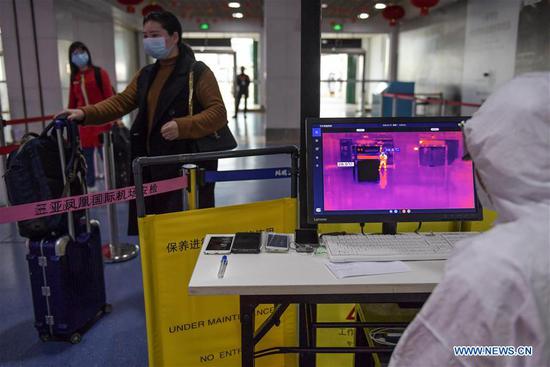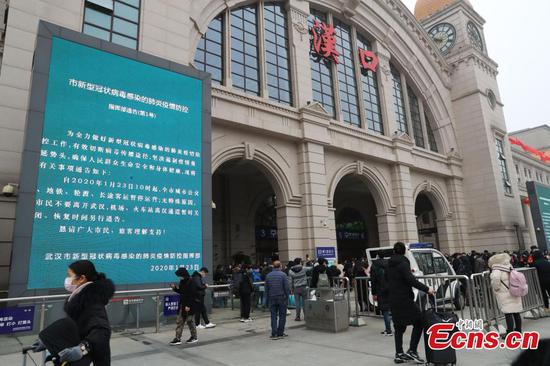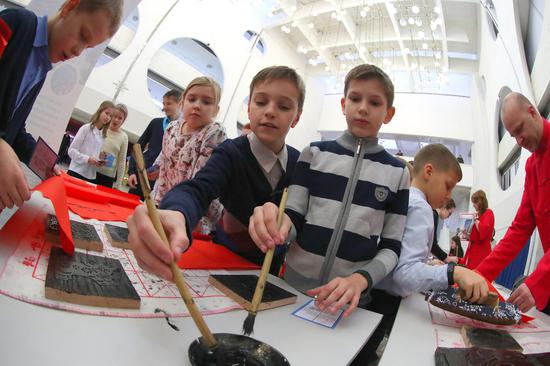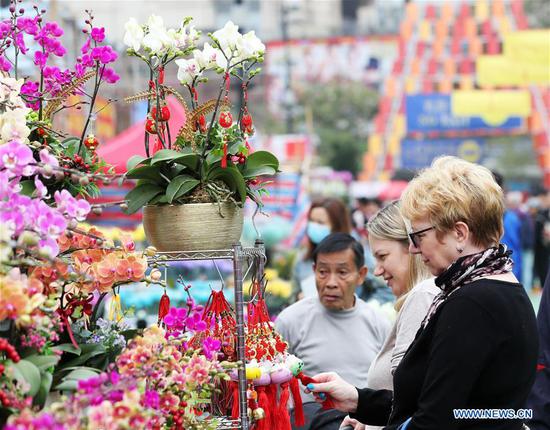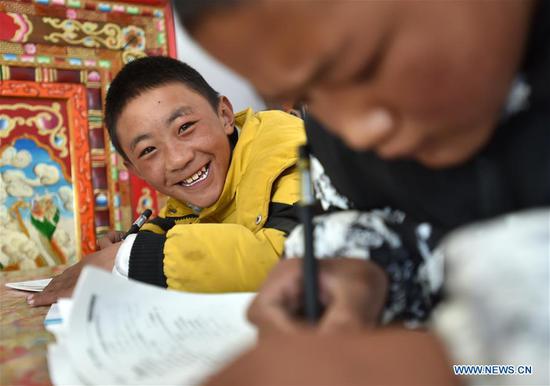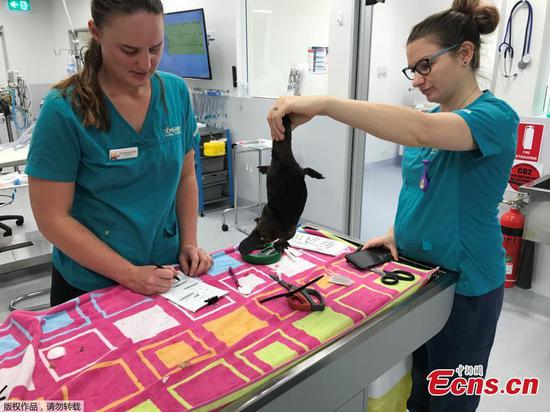
A woman tries safety eyewear with the help of an assistant at the China International Exhibition of Senior Care, Rehabilitation Medicine and Healthcare in Beijing in March. [Photo by Chen Xiaogen/For China Daily]
Elderly people who prospered under China's opening-up are fostering lucrative new market
The first wave of workers to benefit from China's reform and opening-up in 1978 has reached retirement age. And many of them are more interested in spending their money on themselves than keeping it for a rainy day.
Ke Shichang, 61, who retired last year, said he is busier now than when he was working.
His days are filled with hiking, attending lectures and participating in various pastimes in the coastal city of Dalian, Liaoning province.
He also keeps busy shooting and producing videos, and sharing them online.
Ke spends a lot of time on his videos and is motivated to produce more of them when they attract many likes. Some of his video clips have been viewed more than 200,000 times.
"You can't slack off after retirement. You still have to pursue something to keep your vitality," he said.
Thanks to the continuous improvements in people's living standards, more Chinese senior citizens, like Ke, are pursuing their own interests. Rather than taking care of their grandchildren or haggling at the supermarket, they prefer singing at karaoke bars, dancing in park squares, traveling, learning new skills at a community college or even having cosmetic surgery.
Wang Jinying, 56, is delighted when she's told she looks younger than her age after having surgery to remove spots on her face. "It cost just 5,000 yuan ($721) and has brought me so much happiness. I should have done it earlier," Wang said, adding that she is thinking of having bags under her eyes removed.
By the end of 2018, there were more than 249 million people age 60 or above in China, accounting for 17.9 percent of the total population, up 8.59 million from the previous year, according to the National Bureau of Statistics.
The elderly consumer market has huge potential in China.
Wang Qiao, a professor at the China Academy of Social Sciences' Institute of Population and Labor Economics in Beijing, said the new generation of retired people, especially the well-educated and market savvy, are taking the initiative in deciding what to spend their money on.
"They're paying more attention to safety, quality, convenience and intelligent products, and are more willing to spend money on themselves," Wang said.
The rapid development of online apps-such as taxi hailing and food delivery services and online shopping-are providing more spending options for seniors via smartphones and computers.
123Next >>|

Students from a government-run community college for the elderly in Beijing perform at a Spring Festival gala in Beijing on Jan 11, 2020. [Photo by Wang Zhuangfei/China Daily]
Travel pioneers
"You're never too old to learn" is a saying that Li Guizhi frequently quotes.
The 67-year-old retired doctor from Laixi, Shandong province, tours the world to expand her horizons and enrich her knowledge.
"Every year, I visit several places. It is really a good way to learn history, civilization and folk customs by visiting cities around the world," Li said, "touring keeps us in a healthy state."
Last year, she and her husband wanted to see the Hong Kong-Zhuhai-Macao Bridge.
"I was always curious about how the bridge works linking the three metropolises. Is the undersea tunnel part of the bridge safe? All of my questions were answered after visiting the bridge, it is really amazing," Li said.
This year, Li plans to visit Europe."Most of us lived a hard life when we were young, so why not enjoy your later years and make your life more meaningful?" she said.
Li also organized a group of 10 seniors to learn how to play the cucurbit flute. To ensure her fellow students have permanent memories of the joy of learning the flute, Li has photographs of their performance printed. "The photos record wonderful moments of our lives as elders, which are much more precious than the money I spend," Li said.
A survey by the China National Committee on Aging showed that elderly tourists in China now account for more than 20 percent of the country's annual tourist numbers.
According to a report on the travel habits of elderly people by online travel agency Ctrip, 65 percent of elderly travelers take more than three trips a year. A growing number of elderly people are making online reservations independently, the survey said.
The stereotype that older travelers only sleep or take photos is also out of date. Their main concerns are about the comfort of hotels, the ease of travel and reliable Wi-Fi access.
Beijing resident Zhu Hongying, 56, has been to the United States, Germany, Italy and Austria. Last year, she and her family lived in the US state of Hawaii for a month and Seattle, Washington, for the same period of time.
"It is quite obvious that in recent years, my friends have been traveling a lot more," she said.
"In addition to traveling with family, some people also organize trips with old friends. After retirement, we have plenty of time."
Zhu said traveling broadened her vision and enabled her to experience the world, which helped her not let "trivial things" annoy her.
Expanded horizons
The rise of tourism, entertainment and other markets for the elderly highlights the increase in the spending capacity of older people. Many seniors now have both money and leisure time, allowing them to pursue fashion, high-tech products and luxury items.
The elderly are also finding time to expand their minds through education.
A government-run community college for the elderly in Beijing's Dongcheng district has enrolled more than 4,000 students. Although the college offers more than 100 classes, it is still hard to gain admission.
But the situation is not uncommon in today's China.
According to the China Association of Universities for the Aged, there are more than 70,000 learning institutions and schools for the elderly in China, with more than 8 million students on campus.
Despite the high number of classes for the elderly, educating older people in large numbers for free does not necessarily meet the needs of society.
"The classes are good for elderly people to develop their hobbies with no or little tuition fees, but they might not be financially sustainable," said Wang from the Institute of Population and Labor Economics.
She suggested that retired people pay tuition fees and study at regular universities for proper degrees."Making the elderly pay for their tertiary education should be put on the agenda," she said.
|<>|

Mom and pop shop
China's elderly are strongly embracing the digital era. The internet is not only an important source of information for them, but also a vital tool for networking, entertainment and shopping.
According to a report on China's urban consumption last year by Sequoia Capital China, the "proportion of urban elderly groups connected to the internet is already very high, and the degree of dependence on the internet is even more than younger people."
Of the elderly people surveyed, 66 percent said they spend more than a quarter of their free time on mobile internet. Of the elderly who have mobile internet, half of them use e-commerce apps such as Taobao, JD and Pinduoduo.
A year ago, Zhang Manhua, 69, from Dandong, Liaoning province, learned from her daughter how to shop online.
Since then, she shops online at least four to five times a month. All the family's daily necessities such as rice, flour, cooking oil and pots are also bought online.
"Copy the product link, open Taobao, click on the coupon, then complete the purchase. Then all you need to do is wait for the delivery," she says, explaining to a friend how to use discount coupons online.
"It can be delivered to your home. You can also shop around for the best price and quality. If you're not satisfied with the product, you can return it for a full refund," she added.
According to a report on online consumption trends last year conducted by JD's research team, middle-aged and elderly people provided "significant opportunities" due to the penetration of the internet.
A growing number of older people are using mobile phones to buy home-delivered meals, medicines and supermarket items. Last year, online sales of furniture, household necessities, kitchenware, home textiles and other products popular with the elderly increased more than tenfold.
The report pointed out that with the increase in elderly people's income, the requirements for enjoying high-quality later years are on the rise.
Guidance needed
China National Committee on Aging statistics show that the elderly will constitute more than one fourth of China's total population by 2035 and one third by 2050.
The committee also predicted that China's elderly consumption market will reach 3.79 trillion yuan this year.
China's "aging industry" has huge market potential and development prospects, and is expected to become a new driver of growth.
In September, the Ministry of Civil Affairs issued a guideline on expanding the supply of old-age care services and promoting the uptake of such services.
The market in China for old-age care will prosper, however, the services need to be tailored to elderly people's needs and also be within their capacity to pay.
The guideline also pointed out that expanding old-age care services is crucial to the well-being of hundreds of millions of elderly people and their families.
Wang said the elderly consumer market is a prosperous one, but added that services for older people needed to be improved.
In Japan, which has a higher proportion of elderly people than China, aging is not regarded as a problem because of the positive economic impact of elderly consumption.
Wang suggested developing more products and services suited to the elderly, especially high-quality ones, such as home care services for disabled older people.
|<











